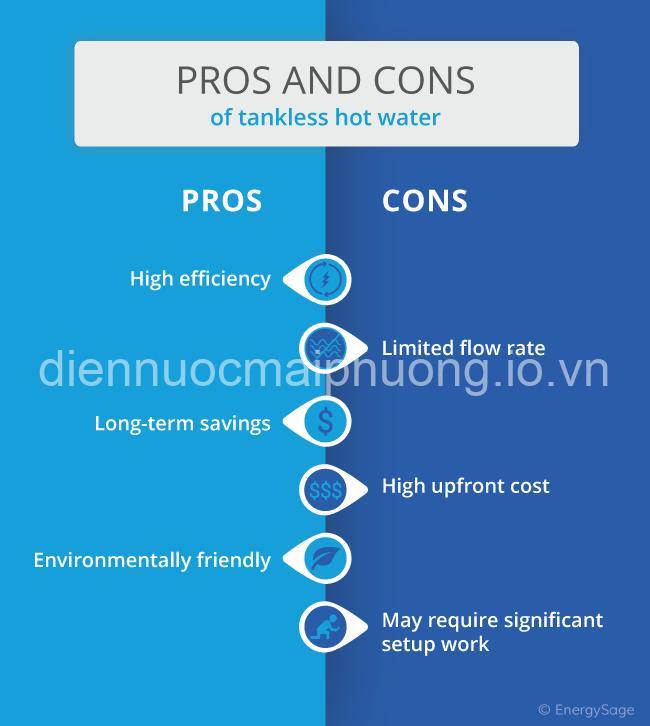Water knowledge
Tankless Water Heater Benefits: Energy Savings, Endless Hot Water & More
Tankless Water Heater Benefits: Energy Savings, Endless Hot Water & More. In today’s article, diennuocmaiphuong.io.vn will explore with you in the most detailed and complete way. See now!
Energy Efficiency: Saving Money and the Environment
Let’s face it, we all want to save money and be kind to the planet. Tankless water heaters excel in both areas. Unlike traditional tank heaters, which constantly heat a large tank of water, even when it’s not needed, tankless heaters only heat water when you demand it. This “on-demand” heating eliminates the energy waste associated with preheating and keeping a large tank of water hot.
Imagine this: You turn on the shower and instantly enjoy a steady stream of hot water, without waiting for a tank to heat up. Tankless water heaters deliver this convenience, allowing you to shower, wash dishes, and run your laundry simultaneously without running out of hot water.
But the real magic happens behind the scenes. By heating only the water you need, you drastically reduce your energy consumption. This translates into significant cost savings on your energy bills.
According to the U.S. Department of Energy, tankless water heaters can save you up to 30% on your energy bill compared to traditional tank heaters. In addition to saving money, you’re also reducing your carbon footprint by using less energy.
Here are some examples of how tankless water heaters can save you money:
- A family of four: Could save around $100-$200 per year on their energy bill.
- A large household: Could save $300-$500 or more per year, depending on usage.
These savings quickly add up, making tankless water heaters a wise investment in your home’s energy efficiency and your wallet.

Endless Hot Water: No More Waiting
Remember the days of waiting for a tank to heat up before you could take a shower? With tankless water heaters, those days are over. Tankless heaters offer a continuous flow of hot water, ensuring you never run out, even when multiple people are using hot water simultaneously.
Here’s how it works:
- When you turn on a hot water tap, the water flows through the tankless unit.
- The unit’s burner (gas or electric) heats the water instantly.
- The heated water is then delivered to your faucet, shower, or appliance.
This process is repeated with every demand for hot water, ensuring a consistent supply.
No more rushing to finish your shower before someone else needs hot water. No more cold water surprises while doing dishes or laundry. Tankless water heaters deliver the freedom of endless hot water, making life easier and more enjoyable.
Longer Lifespan: Reduced Maintenance and Costs
Imagine having a water heater that lasts for years, requiring minimal maintenance. That’s the beauty of tankless water heaters. They typically last much longer than traditional tank heaters, often boasting a lifespan of 15 to 20 years or even more.
Why do tankless water heaters last longer?
- Reduced wear and tear: Unlike tank heaters, which are constantly heating and cooling water, tankless heaters only heat water when needed, reducing wear and tear on the system.
- Fewer moving parts: Tankless units have fewer moving parts, leading to fewer maintenance needs and breakdowns.
- No sediment buildup: Tank heaters are prone to sediment buildup, which can clog the unit and shorten its lifespan. Tankless heaters have less sediment buildup thanks to their on-demand heating.
Here’s what this means for you:
- Reduced maintenance costs: You’ll spend less time and money on repairs and replacements.
- Increased peace of mind: You’ll have less worry about your water heater failing during peak usage.
- Long-term cost savings: The initial cost of a tankless water heater may be higher, but its longer lifespan and reduced maintenance costs quickly offset this initial expense.
Space Savings: Ideal for Smaller Homes and Limited Areas
Tankless water heaters are a fantastic choice for homes with limited space. Their compact design requires significantly less space than traditional tank heaters.
Compare the space requirements:
- Traditional tank heater: Typically requires around 30-50 gallons of space.
- Tankless water heater: Can be installed on a wall or in a small closet, taking up only a few square feet.
This space-saving feature makes tankless heaters ideal for:
- Smaller homes and apartments: Where space is at a premium.
- Basements and utility rooms: Where limited space can be an issue.
- Renovations: Where existing space is at a premium.
Water Quality: Potentially Improved Water Quality
While not a primary function of tankless water heaters, they can potentially improve water quality. Traditional tank heaters are prone to sediment buildup, which can affect water quality and clog your plumbing.
How do tankless water heaters improve water quality?
- Reduced sediment buildup: The on-demand heating of tankless heaters reduces sediment buildup, leading to cleaner water.
- No rust or corrosion: Tankless units are less prone to rust and corrosion, which can contaminate water.
Important Note: It’s crucial to maintain your tankless water heater regularly for optimal water quality. This includes flushing the unit periodically to remove any sediment buildup.
Considerations for Choosing a Tankless Water Heater
Before you commit to a tankless water heater, there are a few things to consider:
- Water Demand: You’ll need to determine the appropriate size and capacity for your household’s hot water needs. If you have a large family or frequent hot water usage, you’ll need a higher-capacity unit.
- Water Pressure: Tankless water heaters require sufficient water pressure to operate efficiently. If you have low water pressure, you might need a booster pump to ensure optimal performance.
- Installation Costs: While tankless water heaters offer long-term cost savings, their initial cost may be higher than traditional tank heaters. You’ll need to factor in installation costs and consider any available rebates or incentives.
- Professional Installation: Proper installation is essential for optimal performance and safety. Always hire a licensed plumber or electrician for professional installation.
Comparing Tankless and Traditional Water Heaters
Here’s a table comparing key features, benefits, and drawbacks of both types of water heaters:
| Feature | Tankless Water Heater | Traditional Water Heater |
|---|---|---|
| Energy Efficiency | High | Low |
| Hot Water Supply | Endless | Limited |
| Lifespan | Long (15-20 years) | Short (8-12 years) |
| Space Requirements | Compact | Large |
| Water Quality | Potentially better | Can be affected by sediment |
| Installation Costs | High (initial) | Low (initial) |
| Maintenance Costs | Low | Moderate |
Conclusion
Tankless water heaters offer a compelling combination of energy efficiency, endless hot water, longer lifespan, space savings, and potential water quality improvements. While the initial cost may be higher, the long-term savings and convenience make tankless water heaters a smart investment for your home.
If you have any questions about tankless water heaters or need assistance choosing the right one for your needs, please visit my website diennuocmaiphuong.io.vn or leave a comment below. I’d be happy to help you find the perfect solution for your home!
FAQs about Understanding the Benefits of Tankless Water Heaters
What is the difference between a tankless water heater and a traditional water heater?
Tankless water heaters provide hot water on demand, heating water only when you need it. Traditional tank heaters constantly heat a large tank of water, even when it’s not in use.
Are tankless water heaters worth the investment?
Yes, tankless water heaters offer significant long-term benefits. Their energy efficiency, endless hot water, longer lifespan, and space savings make them a worthwhile investment.
How do tankless water heaters affect water pressure?
Tankless water heaters require sufficient water pressure to operate efficiently. If you have low water pressure, you may need a booster pump to ensure optimal performance.
How much does it cost to install a tankless water heater?
The cost of installing a tankless water heater varies depending on the size, type, and location of your home. It’s best to consult with a licensed plumber or electrician for an accurate estimate.
What are the maintenance requirements for tankless water heaters?
Tankless water heaters require minimal maintenance, typically just an annual flush to remove sediment buildup. However, it’s essential to consult the manufacturer’s instructions for specific maintenance recommendations.
Jessica David Rodriguez, owner of diennuocmaiphuong.io.vn, is a dedicated professional with a passion for sharing her expertise in electrical and plumbing.
EAVs
- Tankless Water Heater, Attribute: Energy Efficiency, Value: High
- Tankless Water Heater, Attribute: Lifespan, Value: Long (15-20 years)
- Tankless Water Heater, Attribute: Cost, Value: High (initial), Low (long-term)
- Tankless Water Heater, Attribute: Hot Water Supply, Value: Endless
- Tankless Water Heater, Attribute: Space Requirements, Value: Compact
- Traditional Water Heater, Attribute: Energy Efficiency, Value: Low
- Traditional Water Heater, Attribute: Lifespan, Value: Short (8-12 years)
- Traditional Water Heater, Attribute: Cost, Value: Low (initial), High (long-term)
- Traditional Water Heater, Attribute: Hot Water Supply, Value: Limited
- Traditional Water Heater, Attribute: Space Requirements, Value: Large
- Tankless Water Heater, Attribute: Water Pressure, Value: Requires sufficient pressure
- Tankless Water Heater, Attribute: Water Quality, Value: Potentially better
- Tankless Water Heater, Attribute: Installation Complexity, Value: Moderate
- Tankless Water Heater, Attribute: Maintenance Needs, Value: Low
- Traditional Water Heater, Attribute: Water Pressure, Value: Less critical
- Traditional Water Heater, Attribute: Water Quality, Value: Can be affected by sediment
- Traditional Water Heater, Attribute: Installation Complexity, Value: Simple
- Traditional Water Heater, Attribute: Maintenance Needs, Value: Moderate
- Tankless Water Heater, Attribute: Environmental Impact, Value: Low
- Traditional Water Heater, Attribute: Environmental Impact, Value: High
EREs
- Tankless Water Heater, Has, Energy Efficiency
- Tankless Water Heater, Has, Lifespan
- Tankless Water Heater, Requires, Sufficient Water Pressure
- Tankless Water Heater, Offers, Endless Hot Water
- Tankless Water Heater, Requires, Professional Installation
- Tankless Water Heater, Leads to, Cost Savings
- Traditional Water Heater, Has, Limited Hot Water Supply
- Traditional Water Heater, Prone to, Sediment Buildup
- Traditional Water Heater, Requires, Frequent Maintenance
- Traditional Water Heater, Consumes, More Energy
- Traditional Water Heater, Occupies, More Space
- Water Heater, Influences, Water Quality
- Water Heater, Impacts, Environmental Impact
- Water Heater, Requires, Installation
- Water Heater, Offers, Different Features
- Water Heater, Provides, Hot Water
- Water Heater, Consumes, Energy
- Water Heater, Requires, Maintenance
- Water Heater, Occupies, Space
- Water Heater, Costs, Money
Semantic Triples
- (Tankless Water Heater, is, Energy Efficient)
- (Tankless Water Heater, has, Long Lifespan)
- (Tankless Water Heater, provides, Endless Hot Water)
- (Tankless Water Heater, requires, Sufficient Water Pressure)
- (Tankless Water Heater, needs, Professional Installation)
- (Tankless Water Heater, offers, Cost Savings)
- (Traditional Water Heater, has, Limited Hot Water Supply)
- (Traditional Water Heater, is, Less Energy Efficient)
- (Traditional Water Heater, requires, More Frequent Maintenance)
- (Traditional Water Heater, has, Shorter Lifespan)
- (Water Heater, impacts, Water Quality)
- (Water Heater, influences, Environmental Impact)
- (Water Heater, requires, Installation)
- (Water Heater, needs, Maintenance)
- (Water Heater, consumes, Energy)
- (Water Heater, occupies, Space)
- (Water Heater, provides, Hot Water)
- (Water Heater, costs, Money)
- (Water Heater, offers, Different Features)
- (Water Heater, has, Various Types)
